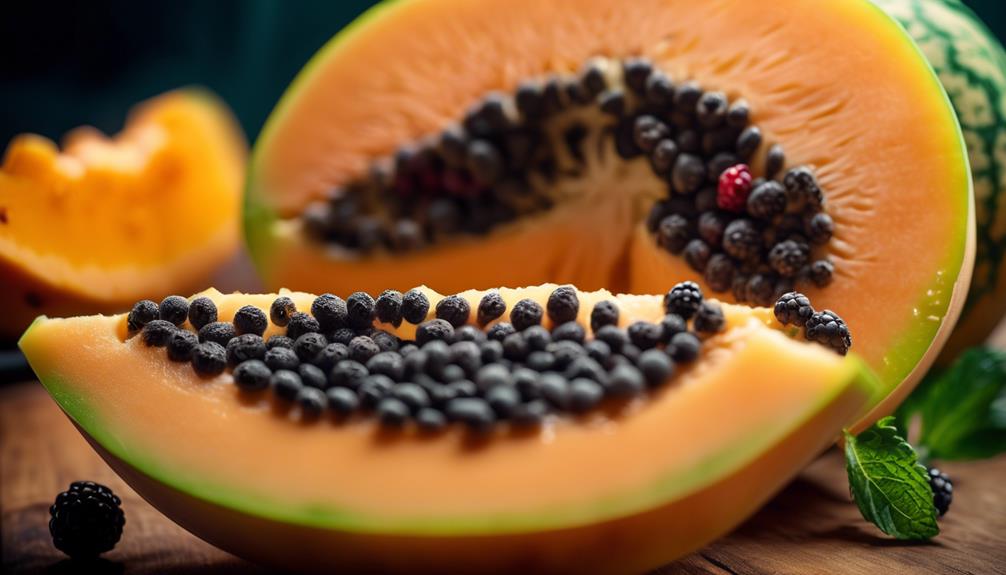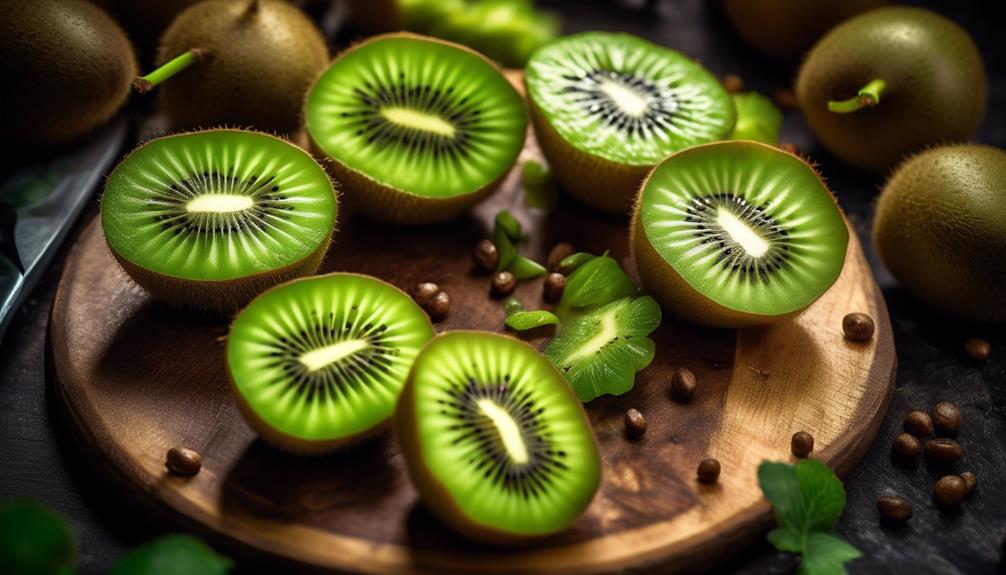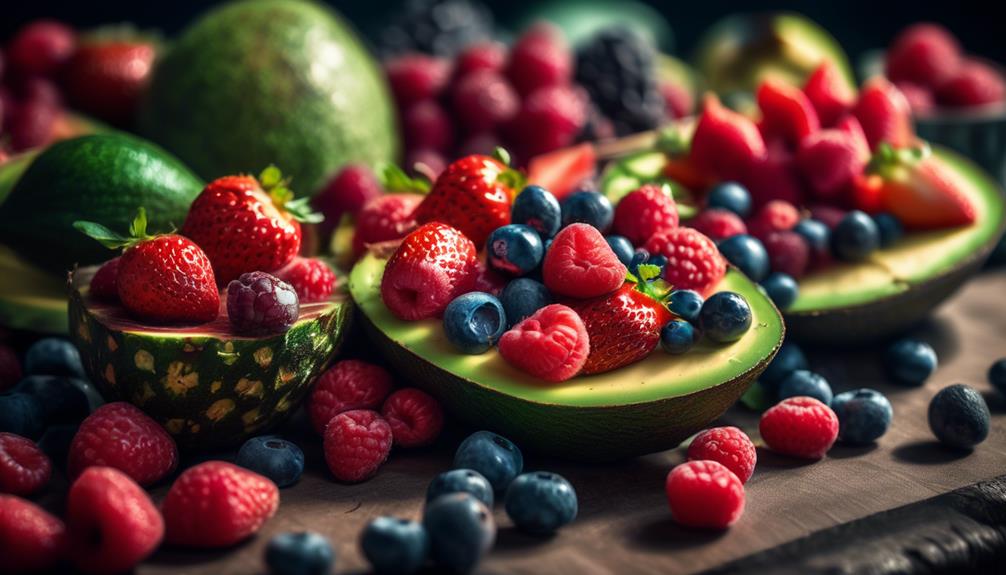Imagine you're standing in front of a vibrant fruit market, the air filled with the sweet aroma of fresh produce. As you scan the colorful array of fruits, your eyes lock onto a basket of strawberries. You reach for one, only to hesitate, wondering if it fits into your vegetarian keto diet.
Well, fear not, because in this discussion, we will unveil the top low-carb fruits that are perfect for your dietary needs. These fruits not only offer a burst of flavor but also keep your carb intake in check.
So, let's explore the tantalizing world of low-carb fruits together, and discover how you can satisfy your taste buds while staying true to your vegetarian keto lifestyle.
Strawberries

Strawberries are a delicious and nutrient-rich low-carb fruit that can be enjoyed on a vegetarian keto diet. They aren't only full of flavor but also packed with essential vitamins and minerals. With only 7 grams of net carbs per cup, strawberries make a great addition to your low-carb meal plan.
One popular way to enjoy strawberries on a vegetarian keto diet is by incorporating them into smoothies. Simply blend fresh or frozen strawberries with low-carb ingredients like almond milk, spinach, and protein powder to create a delicious and nutritious strawberry smoothie. This refreshing drink provides a burst of flavor while keeping your carb intake in check.
If you have a sweet tooth and crave desserts, strawberries can be a great option on a vegetarian keto diet. You can make a variety of low-carb strawberry desserts, such as strawberry cheesecake bites or strawberry chia pudding. These desserts aren't only satisfying but also provide the natural sweetness you crave without the excess carbs.
Remember to enjoy strawberries in moderation as part of a balanced diet. While they're low in carbs, it's still important to consider your overall carb intake and make sure it aligns with your specific dietary needs. So go ahead and indulge in some strawberry smoothies and desserts, knowing that you're nourishing your body with a tasty and low-carb treat.
Blueberries
Blueberries aren't only delicious, but they also offer several health benefits. They're packed with antioxidants, which help protect your body against oxidative stress and inflammation.
Additionally, blueberries are low in carbs and high in fiber, making them a great option to incorporate into a vegetarian keto diet.
Health Benefits of Blueberries
One of the most widely recognized fruits for its numerous health benefits, blueberries offer a delicious and nutrient-packed addition to a low-carb vegetarian keto diet. Blueberries are rich in antioxidants, which help protect your body against oxidative stress and inflammation. They're also a great source of vitamins and minerals, including vitamin C and manganese. These little berries are low in calories and carbs, making them a perfect choice for those following a low-carb diet.
Blueberries can be enjoyed in various ways on a vegetarian keto diet. You can add them to your morning smoothie, sprinkle them on top of a salad, or even incorporate them into a low-carb dessert. With their sweet and tangy flavor, blueberries are a versatile ingredient that can enhance the nutritional value and taste of your meals.
Nutritional Value of Blueberries
With their vibrant color and delicious taste, it's no wonder that blueberries aren't only a popular fruit but also a nutrient powerhouse. These tiny berries are packed with essential vitamins, minerals, and antioxidants that offer numerous health benefits.
Here are some key nutritional facts about blueberries:
- Low in carbs: Blueberries are an excellent choice for those following a low-carb vegetarian keto diet. With only 11 grams of net carbs per cup, they can easily fit into your daily carb allowance.
- High in fiber: Blueberries are a great source of dietary fiber, with 4 grams per cup. Fiber helps promote digestion, aids in weight management, and keeps you feeling full.
- Rich in antioxidants: Blueberries are loaded with antioxidants like anthocyanins, which help protect your body against free radicals and reduce inflammation.
- Vitamin C powerhouse: Blueberries are an excellent source of vitamin C, which supports a healthy immune system and promotes collagen production.
Incorporating blueberries into your vegetarian keto diet is easy. Enjoy them as a snack, add them to your salads, or use them in keto-friendly dessert recipes.
How to Incorporate Blueberries Into a Vegetarian Keto Diet
To incorporate blueberries into your vegetarian keto diet, consider adding them to your meals in creative and delicious ways.
Blueberries are a great low-carb fruit option that can add flavor and nutrients to your diet.
One way to incorporate blueberries is by adding them to your smoothies. You can blend them with low-carb ingredients like almond milk, spinach, and a keto-friendly sweetener for a refreshing and nutritious drink.
Another option is to make blueberry infused water. Simply add a handful of blueberries to a pitcher of water and let it sit in the fridge for a few hours. This will infuse the water with a subtle blueberry flavor, making it a tasty and hydrating beverage for your ketogenic lifestyle.
Get creative and experiment with different ways to enjoy the goodness of blueberries while staying on track with your vegetarian keto diet.
Raspberries
Raspberries are a nutritious and delicious low-carb fruit that can be enjoyed as part of a vegetarian keto diet. These berries aren't only flavorful but also packed with health benefits.
Here's how you can incorporate raspberries into your vegetarian keto diet:
- Rich in antioxidants: Raspberries are loaded with antioxidants that help protect your body against oxidative stress and inflammation. These compounds may also have anti-aging effects and support heart health.
- High in fiber: With a whopping 8 grams of fiber per cup, raspberries can help regulate blood sugar levels and aid in digestion. The fiber content also promotes feelings of fullness, making it easier to manage your calorie intake.
- Low in carbs: Raspberries are one of the lowest carb fruits, containing only 7 grams of net carbs per cup. This makes them a perfect choice for those following a keto diet.
- Versatile and delicious: Raspberries can be enjoyed in various ways. Add them to your morning smoothie, sprinkle them on top of salads, or enjoy them as a snack on their own. Their natural sweetness makes them a great alternative to sugary desserts.
Incorporating raspberries into your vegetarian keto diet not only adds a burst of flavor but also provides numerous health benefits. So go ahead and indulge in these delightful berries while staying on track with your low-carb lifestyle.
Blackberries

Blackberries, another nutritious and delicious low-carb fruit, can be a great addition to your vegetarian keto diet. These small berries are packed with health benefits and can be enjoyed in a variety of recipes.
When it comes to health benefits, blackberries are rich in antioxidants, vitamins, and minerals. They're a great source of vitamin C, which helps boost your immune system and protect against oxidative stress. Blackberries also contain fiber, which aids in digestion and promotes feelings of fullness, making them a satisfying snack for those following a keto diet.
Incorporating blackberries into your vegetarian keto diet is easy and delicious. You can enjoy them as a topping for your morning yogurt or blend them into a low-carb smoothie. For a refreshing dessert, try making a blackberry chia seed pudding by combining blackberries, unsweetened almond milk, and chia seeds. Another idea is to add blackberries to your salads for a burst of flavor and added nutrients.
Avocado
Avocado is a nutrient-dense fruit that offers numerous health benefits. It's packed with healthy fats, fiber, vitamins, and minerals, making it a great addition to a vegetarian keto diet.
Incorporating avocado into your recipes can add creaminess, richness, and a boost of nutrients, whether it's in salads, smoothies, or as a topping for low-carb bread.
Nutritional Benefits of Avocado
With its rich nutritional profile, the avocado offers a multitude of health benefits for those following a vegetarian keto diet. Here are some of the reasons why incorporating avocado into your diet can be beneficial:
- High in healthy fats: Avocados are loaded with monounsaturated fats, which can help improve heart health and reduce inflammation.
- Rich in fiber: Avocados are an excellent source of dietary fiber, promoting healthy digestion and helping you feel fuller for longer.
- Packed with vitamins and minerals: Avocados are a good source of vitamins C, E, K, and B-6, as well as minerals like potassium and folate.
- Low in carbs: Avocados are low in carbohydrates, making them a great choice for those following a low-carb diet like vegetarian keto.
Incorporating avocado into smoothies or trying out different avocado toast variations can be a delicious and nutritious way to enjoy this versatile fruit while reaping its health benefits.
Incorporating Avocado Into Recipes
Incorporating avocado into your recipes can add a creamy and nutritious element to your meals.
Avocado is a versatile fruit that can be used in a variety of dishes, including salads and smoothies.
For a refreshing and satisfying salad, try combining sliced avocado with mixed greens, cherry tomatoes, cucumbers, and a drizzle of olive oil and lemon juice. The creamy texture of the avocado pairs well with the crispness of the vegetables.
If you're looking for a quick and easy breakfast or snack option, avocado smoothies are a great choice. Simply blend ripe avocado with your favorite non-dairy milk, a sweetener of your choice, and some ice for a creamy and delicious smoothie.
Avocado adds healthy fats and fiber, making it a great addition to your vegetarian keto diet.
Lemon

Lemon, a tangy and versatile fruit, is a great addition to a low-carb vegetarian keto diet. Not only does it add a burst of flavor to your dishes, but it also offers a range of health benefits.
Here are four reasons why you should incorporate lemon into your recipes:
- Rich in Vitamin C: Lemons are a great source of vitamin C, which is essential for a strong immune system. It also acts as an antioxidant, protecting your cells from damage caused by free radicals.
- Aid in Digestion: Lemon juice can help stimulate the production of digestive enzymes, promoting better digestion and preventing digestive issues like bloating and constipation.
- Alkalizing Properties: Despite being acidic, lemons have an alkalizing effect on the body. This can help balance the pH levels, reducing the risk of inflammation and promoting overall health.
- Flavor Enhancer: Lemon juice adds a tangy and refreshing flavor to your dishes without adding extra carbs. It can be used in dressings, marinades, and sauces to enhance the taste of your meals.
Incorporating lemon into your low-carb vegetarian keto diet is easy. Squeeze fresh lemon juice over your salads, use it as a marinade for tofu or vegetables, or add it to your water for a refreshing and hydrating drink. With its health benefits and versatility, lemon is a must-have ingredient in your kitchen.
Lime
Lime, a zesty and versatile citrus fruit, is a fantastic addition to a low-carb vegetarian keto diet. Not only does it add a burst of flavor to your meals, but it also offers several health benefits. Lime is low in carbs and high in vitamin C, making it an excellent choice for those following a keto lifestyle.
When it comes to lime recipes, the possibilities are endless. You can use lime juice as a marinade for tofu or tempeh, or squeeze it over your salads for a refreshing tang. Lime zest can add a vibrant citrusy flavor to your dishes, and you can even make a low-carb lime sorbet by combining lime juice, water, and a low-carb sweetener.
In addition to its culinary uses, lime also provides several benefits for those on a keto diet. It contains antioxidants that help protect your cells from damage caused by free radicals. Lime also has anti-inflammatory properties, which can be beneficial for individuals dealing with inflammation-related health issues.
Incorporating lime into your low-carb vegetarian keto diet not only adds flavor to your meals but also provides numerous health benefits. So, go ahead and enjoy this zesty citrus fruit in your recipes and reap the rewards it has to offer.
Tomato

Tomatoes aren't only delicious, but they also offer numerous nutritional benefits. They're a great source of vitamins A and C, potassium, and antioxidants.
Additionally, tomatoes can be incorporated into a variety of low-carb recipes, making them a versatile ingredient for those following a vegetarian keto diet.
Nutritional Benefits of Tomatoes
When incorporating tomatoes into your vegetarian keto diet, you can enjoy their numerous nutritional benefits. Tomatoes aren't only low in carbs but also packed with essential vitamins and minerals. Here are four reasons why tomatoes are a great addition to your diet:
- Rich in Vitamin C: Tomatoes contain a high amount of vitamin C, which is important for a healthy immune system and collagen production.
- Good Source of Potassium: Tomatoes are a great source of potassium, a mineral that helps regulate blood pressure and maintain proper heart function.
- High in Antioxidants: Tomatoes are rich in antioxidants like lycopene, which may help protect against certain types of cancer and reduce inflammation in the body.
- Hydrating Properties: With their high water content, tomatoes can help keep you hydrated and support overall health.
Incorporating tomatoes into your vegetarian keto diet can be easy and delicious. Try tomato-based low carb recipes like stuffed tomatoes, tomato salads, or homemade tomato sauce to enjoy these health benefits while staying on track with your dietary goals.
Tomato-Based Low-Carb Recipes
To incorporate the nutritional benefits of tomatoes into your vegetarian keto diet, explore a variety of delicious tomato-based low-carb recipes.
Tomatoes aren't only low in carbs but also packed with essential nutrients. One popular tomato-based recipe variation is the Caprese salad, which combines tomatoes, fresh mozzarella cheese, and basil.
Another option is tomato soup, made with roasted tomatoes, vegetable broth, and herbs. For a heartier meal, try making zucchini noodles with a tomato-based sauce. Simply spiralize zucchini and toss it in a sauce made from tomatoes, garlic, and olive oil.
Tomatoes are rich in antioxidants like lycopene, which has been linked to various health benefits including reduced risk of heart disease and certain types of cancer.
Tomatoes as a Vegetarian Keto Staple
Incorporating tomatoes into your vegetarian keto diet can provide a versatile and nutrient-rich staple for your meals. Here are some reasons why tomatoes are a great addition to your vegetarian keto lifestyle:
- Low in carbs: Tomatoes are relatively low in carbs, making them suitable for a ketogenic diet. They contain about 2-3 grams of net carbs per 100 grams, making them a great choice for those watching their carbohydrate intake.
- Rich in nutrients: Tomatoes are packed with essential nutrients like vitamin C, potassium, folate, and antioxidants. These nutrients support overall health and help maintain a balanced diet.
- Versatile ingredient: Tomatoes can be used in a variety of keto-friendly recipes, from salads to sauces and even as a base for soups. They add a burst of flavor and color to your meals.
- Antioxidant properties: Tomatoes are rich in lycopene, an antioxidant that has been linked to various health benefits, including reduced risk of heart disease and certain types of cancer.
Incorporating tomatoes into your vegetarian keto diet can add flavor, nutrients, and variety to your meals. Try incorporating them into your favorite tomato-based recipes for a delicious and satisfying vegetarian keto experience.
Coconut

Coconut, a versatile and nutrient-rich fruit, can be a valuable addition to a low-carb vegetarian keto diet. While it's true that coconuts contain carbohydrates, they're also packed with healthy fats and fiber, making them a suitable choice for those following a low-carb lifestyle.
Coconut milk, derived from the flesh of mature coconuts, is a popular dairy alternative for vegetarians on a keto diet. It's low in carbohydrates and high in healthy fats, making it an excellent addition to smoothies, curries, and desserts. However, it's important to note that coconut milk can vary in its carbohydrate content, so it's essential to check the labels and choose brands with no added sugars.
Another valuable component of coconuts is coconut oil, which is extracted from the meat of mature coconuts. Coconut oil is high in medium-chain triglycerides (MCTs), which are easily digestible and quickly converted into energy by the body. MCTs have been shown to boost metabolism and promote weight loss. Additionally, coconut oil is a great cooking oil alternative for low-carb vegetarian keto recipes.
Incorporating coconut into your low-carb vegetarian keto diet can provide you with essential nutrients, healthy fats, and a delicious flavor profile. Just remember to consume coconut products in moderation and choose options that align with your dietary goals.
Watermelon
Watermelon is a refreshing and hydrating fruit that can be enjoyed on a low-carb vegetarian keto diet. Despite its sweet taste, watermelon is relatively low in carbs and can be a great addition to your keto-friendly meal plan. Here are some reasons why watermelon deserves a place on your plate:
- Low in carbs: Watermelon is primarily made up of water and contains only 7 grams of net carbs per 100 grams. This makes it a suitable choice for those following a low-carb diet.
- Hydrating properties: As its name suggests, watermelon is packed with water, which can help keep you hydrated. Staying hydrated is essential for overall health and can aid in weight loss.
- Rich in vitamins: Watermelon is a good source of vitamins A and C, which are important for immune function and skin health. It also contains small amounts of other vitamins and minerals.
- Delicious and versatile: Watermelon can be enjoyed in a variety of ways. From fresh slices to refreshing salads and even as a base for smoothies, there are plenty of watermelon recipes to explore.
Cantaloupe

If you're looking to add another delicious and nutritious fruit to your low-carb vegetarian keto diet, consider adding cantaloupe to your plate. Cantaloupe is a popular fruit known for its sweet and refreshing taste. It's also low in carbs, making it a great choice for those following a low-carb diet.
One great benefit of cantaloupe for vegetarians is its high vitamin C content. Vitamin C is an essential nutrient that helps support a healthy immune system. Cantaloupe is also a good source of potassium, which is important for maintaining proper heart and muscle function.
When it comes to incorporating cantaloupe into your low-carb vegetarian keto diet, there are many delicious recipes to try. One simple option is to enjoy sliced cantaloupe as a snack or add it to a salad for a burst of sweetness. Another idea is to blend it with some unsweetened almond milk and ice for a refreshing smoothie.
Honeydew Melon
Honeydew melon is a delicious low-carb fruit that can be enjoyed on a vegetarian keto diet. It isn't only refreshing but also packed with important nutrients such as vitamin C and potassium.
Incorporating honeydew melon into your meals can be as simple as enjoying it as a snack or adding it to salads and smoothies for a burst of natural sweetness.
Nutritional Benefits
One low-carb fruit that offers a range of nutritional benefits is the refreshing and juicy honeydew melon. Here are some of the health benefits and recipe ideas associated with this delicious fruit:
- High in Vitamin C: Honeydew melon is a great source of vitamin C, which is essential for a healthy immune system and collagen production.
- Hydrating properties: With its high water content, honeydew melon helps keep you hydrated and supports healthy skin.
- Low in calories: Honeydew melon is a guilt-free snack option as it's low in calories, making it suitable for those trying to lose weight.
- Versatile in recipes: Honeydew melon can be used in a variety of recipes, including salads, smoothies, and desserts, adding a sweet and refreshing twist to your dishes.
Incorporating honeydew melon into your diet not only adds a burst of flavor but also provides you with a range of nutritional benefits.
Recipe Ideas
When incorporating honeydew melon into your diet, you'll discover a variety of delicious recipe ideas that showcase its sweet and refreshing flavors.
Honeydew melon isn't only low in carbs but also packed with essential nutrients like vitamin C and potassium.
One simple way to enjoy honeydew melon is to slice it and have it as a refreshing snack.
You can also make a honeydew melon salad by combining it with other low-carb fruits like berries and adding a sprinkle of lime juice for extra tanginess.
For a more indulgent treat, try blending honeydew melon with some unsweetened almond milk and a handful of spinach for a nutritious green smoothie.
Experimenting with different recipe variations will help you find your favorite way to incorporate honeydew melon into your vegetarian keto meal plan.
Kiwi

Kiwi is a versatile fruit that can be enjoyed on a low-carb vegetarian keto diet. It not only adds a burst of flavor to your meals but also provides numerous health benefits.
Here are four reasons why kiwi should be a staple in your low-carb diet:
- Rich in Fiber: Kiwi is an excellent source of dietary fiber, which aids in digestion and helps maintain a healthy weight. It can also help regulate blood sugar levels, making it a great choice for those on a low-carb diet.
- Packed with Vitamins: Kiwi is loaded with essential vitamins, particularly vitamin C, which supports immune function and collagen production. It also contains vitamin K, which promotes bone health.
- Antioxidant Powerhouse: Kiwi is packed with antioxidants that protect the body against cellular damage caused by free radicals. These antioxidants have been linked to a reduced risk of chronic diseases such as heart disease and cancer.
- Low in Carbs: One medium-sized kiwi contains around 10 grams of carbs, making it a suitable choice for those following a low-carb diet. It's also relatively low in calories, making it a guilt-free snack option.
Incorporating kiwi into your low-carb vegetarian keto diet is easy. You can enjoy it as a fresh snack, add it to salads for a burst of flavor, or incorporate it into smoothies and desserts. With its delicious taste and impressive health benefits, kiwi is a must-have fruit for your low-carb journey.
Passionfruit
As you explore more low-carb fruits for your vegetarian keto diet, let's now turn our attention to the delightful and nutritious passionfruit. This tropical fruit isn't only delicious but also packed with nutritional benefits. Passionfruit is low in carbohydrates, making it a great addition to your keto diet. One passionfruit contains only about 4 grams of net carbs, making it a guilt-free choice for those watching their carb intake.
Passionfruit is also rich in vitamins and minerals. It's a good source of vitamin C, which helps boost your immune system and protects against oxidative stress. It also contains vitamin A, which is important for maintaining healthy skin and eye health. Additionally, passionfruit is rich in fiber, which aids digestion and helps keep you feeling full.
When it comes to recipe ideas, passionfruit can be used in a variety of ways. You can enjoy it on its own, simply scooping out the pulp and eating it with a spoon. It also makes a delicious addition to smoothies, salads, and desserts. You can even use passionfruit to make a tangy and refreshing salad dressing or a flavorful marinade for grilled vegetables.
Conclusion
In conclusion, incorporating low-carb fruits into a vegetarian keto diet can offer a delicious and nutritious variety. Strawberries, blueberries, raspberries, blackberries, avocado, cantaloupe, honeydew melon, kiwi, and passionfruit are excellent options.
These fruits provide essential vitamins, minerals, and antioxidants while keeping carbohydrate intake in check.
So, why wait? Start enjoying these mouthwatering low-carb fruits and add a touch of suspense to your vegetarian keto journey!







